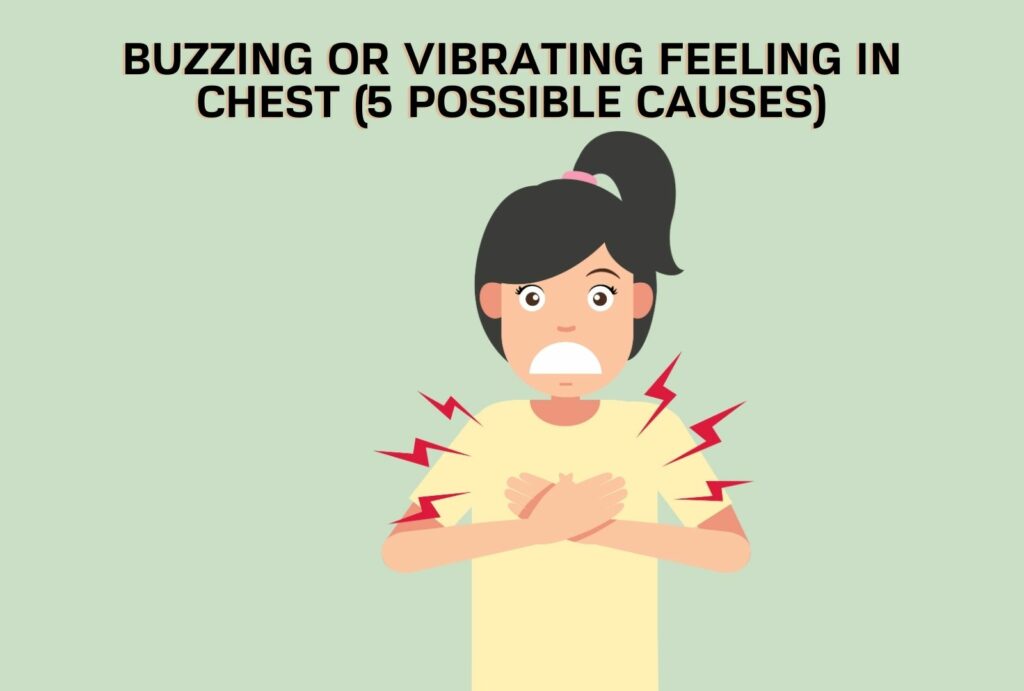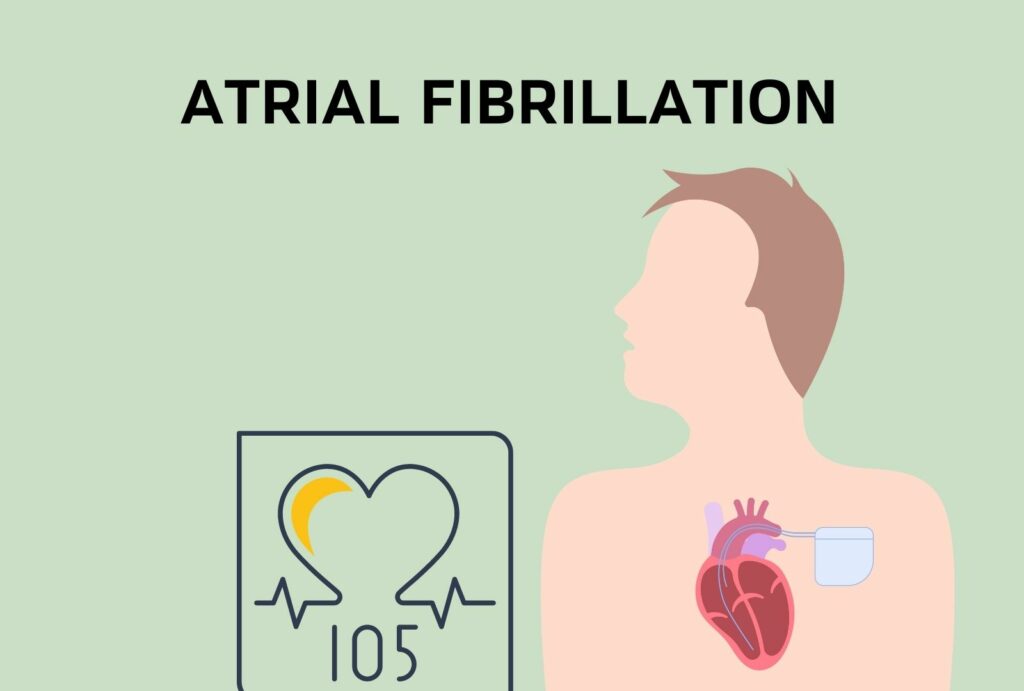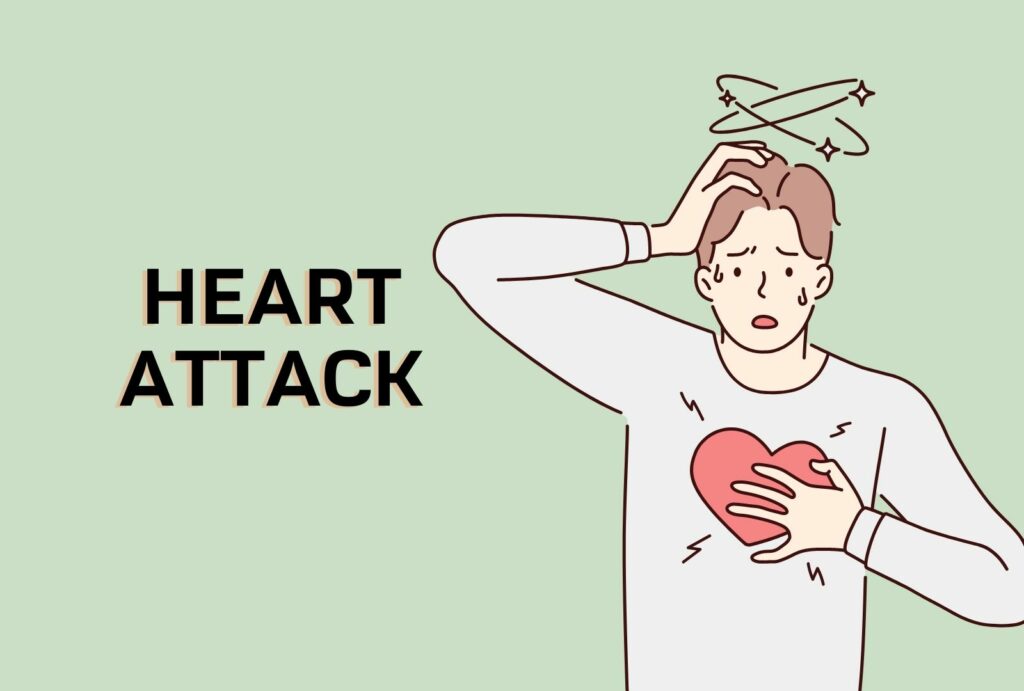
A buzzing or vibrating feeling in the chest can be a distressing experience for many people. It can be caused by various factors, ranging from harmless to potentially serious conditions. Here are five possible causes of a vibration in the chest.
- Anxiety and Stress
Anxiety and stress can cause physical symptoms, including a vibration in the chest. When you are anxious or stressed, your body releases hormones such as adrenaline and cortisol, which can cause a range of physical symptoms, including chest tightness, heart palpitations, and vibrations in the chest. These symptoms can be alarming, but they are usually harmless and will resolve once the anxiety or stress passes.
- Muscle Twitching
Muscle twitching in the chest can also cause a vibrating sensation. This can be caused by a number of factors, including muscle fatigue, dehydration, or an electrolyte imbalance. Muscle twitching can be uncomfortable, but it is usually not a cause for concern. Drinking plenty of water and getting enough rest can help to alleviate the symptoms.
- Heart Palpitations
Heart palpitations are another possible cause of a vibration in the chest. Palpitations are the sensation of your heart beating irregularly, too fast, or too hard. This can cause a fluttering or vibrating sensation in the chest. Palpitations can be caused by a variety of factors, including caffeine, alcohol, or certain medications. In some cases, palpitations can be a sign of a more serious condition, such as an arrhythmia or heart disease, so it is important to speak with a doctor if you experience frequent palpitations.
- Acid Reflux
Acid reflux can also cause a vibrating sensation in the chest. Acid reflux occurs when stomach acid flows back into the esophagus, causing a burning sensation in the chest and throat. In some cases, acid reflux can also cause a vibrating sensation in the chest. If you experience frequent acid reflux, you should speak with a doctor, as it can lead to complications such as esophagitis or Barrett’s esophagus.
- Pneumothorax
A pneumothorax, or collapsed lung, can cause a sudden onset of chest pain and a vibration in the chest. Pneumothorax occurs when air leaks into the space between the lung and the chest wall, causing the lung to collapse. This is a serious condition that requires immediate medical attention.
In conclusion, a vibration in the chest can be caused by a variety of factors, ranging from harmless to potentially serious conditions. If you experience frequent vibrations in the chest, it is important to speak with a doctor to determine the underlying cause and receive appropriate treatment.
Possible reasons for the vibrating feeling in your chest
If you’ve ever experienced a vibrating feeling in your chest, it can be concerning and uncomfortable. There are a few possible reasons why you may be experiencing this sensation. Here are some possible causes of the vibration in the chest.
- Anxiety and Stress
One of the most common causes of a vibrating feeling in the chest is anxiety and stress. When you experience anxiety, your body releases adrenaline, which can cause physical sensations such as heart palpitations, chest tightness, and vibrations in the chest. Stress can also cause similar physical symptoms. While the symptoms can be alarming, they are usually harmless and will subside once the anxiety or stress passes.
- Muscle Twitching
Another possible cause of a vibrating feeling in the chest is muscle twitching. Muscle twitching can occur for various reasons, including fatigue, dehydration, and an electrolyte imbalance. Muscle twitching can be uncomfortable, but it is typically not a cause for concern. Ensuring you drink enough water, getting sufficient rest, and incorporating stretching or massages can help alleviate these symptoms.
- Heart Palpitations
Heart palpitations are another possible cause of a vibration in the chest. Palpitations are when you feel like your heart is beating too fast or too hard, or irregularly. This can cause a vibrating or fluttering sensation in the chest. Palpitations can be triggered by various factors, including caffeine, alcohol, or certain medications. Sometimes, heart palpitations can be a sign of a more serious condition, such as an arrhythmia or heart disease, so it is essential to speak with a doctor if you experience frequent palpitations.
- Acid Reflux
Acid reflux can also cause a vibrating sensation in the chest. Acid reflux happens when stomach acid flows back into the esophagus, causing a burning sensation in the chest and throat. In some cases, it can also cause a vibrating sensation in the chest. If you experience frequent acid reflux, you should speak with a doctor, as it can lead to complications such as esophagitis or Barrett’s esophagus.
- Pneumothorax
A pneumothorax or collapsed lung can also cause a sudden onset of chest pain and a vibration in the chest. This happens when air leaks into the space between the lung and the chest wall, causing the lung to collapse. This is a serious condition that requires immediate medical attention.
In conclusion, there are various reasons why you may experience a vibrating feeling in your chest. While some of these causes are harmless and will subside on their own, others may require medical attention. If you experience frequent vibrations in the chest or other concerning symptoms, it is always best to speak with your doctor to determine the underlying cause and receive appropriate treatment.
Atrial fibrillation

Atrial fibrillation is a common heart condition that can cause a range of symptoms, including a vibration in the chest. Atrial fibrillation is an irregular heartbeat that can lead to blood clots, stroke, and other serious complications. Here are some important facts about atrial fibrillation and how it can cause a vibration in the chest.
- What is Atrial Fibrillation?
Atrial fibrillation, also known as AFib, is a condition that causes the heart to beat irregularly and often rapidly. The upper chambers of the heart, called the atria, beat out of sync with the lower chambers, called the ventricles. This can cause a range of symptoms, including palpitations, shortness of breath, fatigue, and a vibration in the chest.
- How Does Atrial Fibrillation Cause a Vibration in the Chest?
A vibration in the chest is a common symptom of atrial fibrillation. This sensation is often described as a fluttering or a quivering feeling in the chest. It occurs because the atria are beating irregularly and are not pumping blood effectively. This can cause blood to pool in the atria, leading to a sensation of vibration or fluttering.
- Who is at Risk for Atrial Fibrillation?
Atrial fibrillation is a common heart condition that can affect people of all ages, but it is more common in older adults. People who have high blood pressure, diabetes, obesity, or a history of heart disease are at a higher risk of developing atrial fibrillation. Other risk factors include a family history of atrial fibrillation, excessive alcohol consumption, and smoking.
- Treatment for Atrial Fibrillation
The treatment for atrial fibrillation depends on the severity of the condition and the underlying cause. Treatment may include medications to control the heart rate and rhythm, blood thinners to prevent blood clots, or procedures to restore normal heart rhythm. In some cases, lifestyle changes such as exercise, weight loss, and stress management can also be helpful.
- Complications of Atrial Fibrillation
If left untreated, atrial fibrillation can lead to serious complications, including stroke, heart failure, and blood clots. It is important to seek medical attention if you experience symptoms of atrial fibrillation, such as a vibration in the chest, palpitations, or shortness of breath.
In conclusion, atrial fibrillation is a common heart condition that can cause a range of symptoms, including a vibration in the chest. It is important to seek medical attention if you experience symptoms of atrial fibrillation, as it can lead to serious complications if left untreated. With the right treatment and lifestyle changes, most people with atrial fibrillation can manage their condition and lead a healthy life.
Heart Attack

A heart attack, also known as a myocardial infarction, is a serious medical emergency that occurs when the blood flow to the heart is blocked. One of the common symptoms of a heart attack is a vibration in the chest. Here are some important facts about heart attacks and how they can cause a vibration in the chest.
- What is a Heart Attack?
A heart attack occurs when the blood flow to the heart is blocked, usually by a blood clot. This can cause damage to the heart muscle and can be life-threatening if not treated promptly. Symptoms of a heart attack can include chest pain or discomfort, shortness of breath, nausea, sweating, and a vibration in the chest.
- How Does a Heart Attack Cause a Vibration in the Chest?
A vibration in the chest is a common symptom of a heart attack. This sensation is often described as a quivering or fluttering feeling in the chest. It occurs because the heart muscle is not receiving enough blood and is not pumping effectively. This can cause the heart muscle to vibrate or quiver, leading to a sensation of vibration or fluttering in the chest.
- Who is at Risk for a Heart Attack?
Certain factors can increase the risk of having a heart attack. These include a family history of heart disease, smoking, high blood pressure, high cholesterol levels, diabetes, obesity, and a sedentary lifestyle. Men are also more likely to have a heart attack than women.
- Treatment for a Heart Attack
Prompt treatment for a heart attack is crucial to prevent further damage to the heart muscle and improve outcomes. Treatment may include medications to break up blood clots, improve blood flow, and reduce the workload on the heart. In some cases, procedures such as angioplasty or coronary artery bypass surgery may be necessary to restore blood flow to the heart.
- Complications of a Heart Attack
If left untreated, a heart attack can lead to serious complications, including heart failure, arrhythmias, and even death. It is important to seek medical attention immediately if you experience symptoms of a heart attack, such as a vibration in the chest, chest pain, or shortness of breath.
In conclusion, a heart attack is a serious medical emergency that can cause a range of symptoms, including a vibration in the chest. It is important to seek medical attention immediately if you experience symptoms of a heart attack, as prompt treatment can improve outcomes and prevent complications. With the right treatment and lifestyle changes, many people can recover from a heart attack and lead a healthy life.
FAQs
- What causes a vibration in the chest?
A vibration in the chest can be caused by a variety of factors, including anxiety and panic attacks, muscle twitches and spasms, acid reflux, arrhythmia, and heart attack. If you experience this sensation, it is important to seek medical attention to determine the underlying cause and receive appropriate treatment.
- Is a vibration in the chest always a sign of a serious condition?
Not necessarily. In many cases, a vibration in the chest is caused by benign factors such as muscle twitches or anxiety. However, it is important to seek medical attention to rule out more serious conditions such as arrhythmia or heart attack.
- How is a vibration in the chest diagnosed?
The diagnosis of a vibration in the chest will depend on the underlying cause. Your doctor may perform a physical examination, order imaging tests such as an electrocardiogram (ECG), or recommend further testing to determine the cause of your symptoms.
- How is a vibration in the chest treated?
The treatment for a vibration in the chest will depend on the underlying cause. For example, muscle twitches or spasms can be managed with rest and relaxation techniques, while acid reflux may require medications or lifestyle changes. More serious conditions such as arrhythmia or heart attack may require more intensive treatment, including medications, procedures, or surgery.
- Can a vibration in the chest be prevented?
Prevention of a vibration in the chest will depend on the underlying cause. For example, lifestyle changes such as reducing stress and anxiety, quitting smoking, and maintaining a healthy weight can help prevent some causes of a vibration in the chest. Managing underlying medical conditions such as high blood pressure or diabetes can also help prevent more serious causes of a vibration in the chest. It is important to speak with your healthcare provider about ways to prevent a vibration in the chest based on your individual risk factors and medical history.
In conclusion, a vibration in the chest can be a concerning symptom that can be caused by a variety of factors. It is important to seek medical attention if you experience this sensation, as it could be a sign of a serious underlying condition. With prompt diagnosis and treatment, most underlying conditions that cause a vibration in the chest can be managed effectively.
Conclusion
In conclusion, a vibration in the chest can be a symptom of various underlying medical conditions. While it can be caused by benign factors such as muscle twitches or anxiety, it is important to seek medical attention if you experience this sensation, as it could be a sign of a more serious condition such as arrhythmia or heart attack. The cause of a vibration in the chest can be diagnosed through physical examination, imaging tests, and further testing. The treatment for a vibration in the chest will depend on the underlying cause and may involve medications, lifestyle changes, procedures, or surgery.
It is important to understand the risk factors for conditions that can cause a vibration in the chest, such as heart disease, high blood pressure, diabetes, and obesity. Managing these risk factors through lifestyle changes and appropriate medical treatment can help prevent serious conditions that can lead to a vibration in the chest. It is also important to seek prompt medical attention if you experience symptoms such as chest pain, shortness of breath, or sweating along with a vibration in the chest, as these could be signs of a heart attack.
Finally, it is important to prioritize your health and seek medical attention when you experience symptoms such as a vibration in the chest. Don’t ignore these symptoms or assume they will go away on their own. Early diagnosis and treatment can improve outcomes and prevent serious complications. Speak with your healthcare provider about any concerns you may have regarding a vibration in the chest or any other symptoms you are experiencing, and work together to develop an appropriate plan of care.
Overall, a vibration in the chest can be a concerning symptom, but with prompt medical attention and appropriate treatment, many underlying conditions can be managed effectively. Take charge of your health, prioritize preventative care, and seek medical attention when necessary to maintain optimal health and well-being.